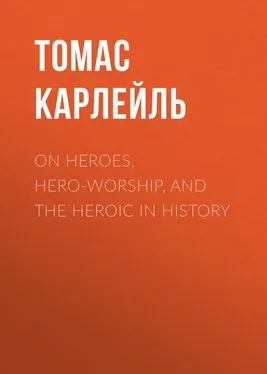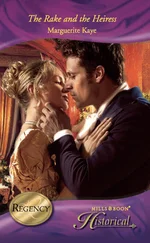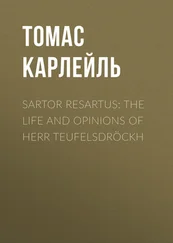Томас Карлейль - On Heroes, Hero-Worship, and the Heroic in History
Здесь есть возможность читать онлайн «Томас Карлейль - On Heroes, Hero-Worship, and the Heroic in History» — ознакомительный отрывок электронной книги совершенно бесплатно, а после прочтения отрывка купить полную версию. В некоторых случаях можно слушать аудио, скачать через торрент в формате fb2 и присутствует краткое содержание. Жанр: foreign_prose, История, foreign_edu, foreign_antique, на английском языке. Описание произведения, (предисловие) а так же отзывы посетителей доступны на портале библиотеки ЛибКат.
- Название:On Heroes, Hero-Worship, and the Heroic in History
- Автор:
- Жанр:
- Год:неизвестен
- ISBN:нет данных
- Рейтинг книги:5 / 5. Голосов: 1
-
Избранное:Добавить в избранное
- Отзывы:
-
Ваша оценка:
- 100
- 1
- 2
- 3
- 4
- 5
On Heroes, Hero-Worship, and the Heroic in History: краткое содержание, описание и аннотация
Предлагаем к чтению аннотацию, описание, краткое содержание или предисловие (зависит от того, что написал сам автор книги «On Heroes, Hero-Worship, and the Heroic in History»). Если вы не нашли необходимую информацию о книге — напишите в комментариях, мы постараемся отыскать её.
On Heroes, Hero-Worship, and the Heroic in History — читать онлайн ознакомительный отрывок
Ниже представлен текст книги, разбитый по страницам. Система сохранения места последней прочитанной страницы, позволяет с удобством читать онлайн бесплатно книгу «On Heroes, Hero-Worship, and the Heroic in History», без необходимости каждый раз заново искать на чём Вы остановились. Поставьте закладку, и сможете в любой момент перейти на страницу, на которой закончили чтение.
Интервал:
Закладка:
For if we will think of it, no Time need have gone to ruin, could it have found a man great enough, a man wise and good enough: wisdom to discern truly what the Time wanted, valor to lead it on the right road thither; these are the salvation of any Time. But I liken common languid Times, with their unbelief, distress, perplexity, with their languid doubting characters and embarrassed circumstances, impotently crumbling down into ever worse distress towards final ruin;—all this I liken to dry dead fuel, waiting for the lightning out of Heaven that shall kindle it. The great man, with his free force direct out of God's own hand, is the lightning. His word is the wise healing word which all can believe in. All blazes round him now, when he has once struck on it, into fire like his own. The dry mouldering sticks are thought to have called him forth. They did want him greatly; but as to calling him forth—! Those are critics of small vision, I think, who cry: "See, is it not the sticks that made the fire?" No sadder proof can be given by a man of his own littleness than disbelief in great men. There is no sadder symptom of a generation than such general blindness to the spiritual lightning, with faith only in the heap of barren dead fuel. It is the last consummation of unbelief. In all epochs of the world's history, we shall find the Great Man to have been the indispensable savior of his epoch;—the lightning, without which the fuel never would have burnt. The History of the World, I said already, was the Biography of Great Men.
Such small critics do what they can to promote unbelief and universal spiritual paralysis: but happily they cannot always completely succeed. In all times it is possible for a man to arise great enough to feel that they and their doctrines are chimeras and cobwebs. And what is notable, in no time whatever can they entirely eradicate out of living men's hearts a certain altogether peculiar reverence for Great Men; genuine admiration, loyalty, adoration, however dim and perverted it may be. Hero-worship endures forever while man endures. Boswell venerates his Johnson, right truly even in the Eighteenth century. The unbelieving French believe in their Voltaire; and burst out round him into very curious Hero-worship, in that last act of his life when they "stifle him under roses." It has always seemed to me extremely curious this of Voltaire. Truly, if Christianity be the highest instance of Hero-worship, then we may find here in Voltaireism one of the lowest! He whose life was that of a kind of Antichrist, does again on this side exhibit a curious contrast. No people ever were so little prone to admire at all as those French of Voltaire. Persiflage was the character of their whole mind; adoration had nowhere a place in it. Yet see! The old man of Ferney comes up to Paris; an old, tottering, infirm man of eighty-four years. They feel that he too is a kind of Hero; that he has spent his life in opposing error and injustice, delivering Calases, unmasking hypocrites in high places;—in short that he too, though in a strange way, has fought like a valiant man. They feel withal that, if persiflage be the great thing, there never was such a persifleur . He is the realized ideal of every one of them; the thing they are all wanting to be; of all Frenchmen the most French. He is properly their god,—such god as they are fit for. Accordingly all persons, from the Queen Antoinette to the Douanier at the Porte St. Denis, do they not worship him? People of quality disguise themselves as tavern-waiters. The Maitre de Poste, with a broad oath, orders his Postilion, " Va bon train ; thou art driving M. de Voltaire." At Paris his carriage is "the nucleus of a comet, whose train fills whole streets." The ladies pluck a hair or two from his fur, to keep it as a sacred relic. There was nothing highest, beautifulest, noblest in all France, that did not feel this man to be higher, beautifuler, nobler.
Yes, from Norse Odin to English Samuel Johnson, from the divine Founder of Christianity to the withered Pontiff of Encyclopedism, in all times and places, the Hero has been worshipped. It will ever be so. We all love great men; love, venerate and bow down submissive before great men: nay can we honestly bow down to anything else? Ah, does not every true man feel that he is himself made higher by doing reverence to what is really above him? No nobler or more blessed feeling dwells in man's heart. And to me it is very cheering to consider that no sceptical logic, or general triviality, insincerity and aridity of any Time and its influences can destroy this noble inborn loyalty and worship that is in man. In times of unbelief, which soon have to become times of revolution, much down-rushing, sorrowful decay and ruin is visible to everybody. For myself in these days, I seem to see in this indestructibility of Hero-worship the everlasting adamant lower than which the confused wreck of revolutionary things cannot fall. The confused wreck of things crumbling and even crashing and tumbling all round us in these revolutionary ages, will get down so far; no farther. It is an eternal corner-stone, from which they can begin to build themselves up again. That man, in some sense or other, worships Heroes; that we all of us reverence and must ever reverence Great Men: this is, to me, the living rock amid all rushings-down whatsoever;—the one fixed point in modern revolutionary history, otherwise as if bottomless and shoreless.
So much of truth, only under an ancient obsolete vesture, but the spirit of it still true, do I find in the Paganism of old nations. Nature is still divine, the revelation of the workings of God; the Hero is still worshipable: this, under poor cramped incipient forms, is what all Pagan religions have struggled, as they could, to set forth. I think Scandinavian Paganism, to us here, is more interesting than any other. It is, for one thing, the latest; it continued in these regions of Europe till the eleventh century: eight hundred years ago the Norwegians were still worshippers of Odin. It is interesting also as the creed of our fathers; the men whose blood still runs in our veins, whom doubtless we still resemble in so many ways. Strange: they did believe that, while we believe so differently. Let us look a little at this poor Norse creed, for many reasons. We have tolerable means to do it; for there is another point of interest in these Scandinavian mythologies: that they have been preserved so well.
In that strange island Iceland,—burst up, the geologists say, by fire from the bottom of the sea; a wild land of barrenness and lava; swallowed many months of every year in black tempests, yet with a wild gleaming beauty in summertime; towering up there, stern and grim, in the North Ocean with its snow jokuls, roaring geysers, sulphur-pools and horrid volcanic chasms, like the waste chaotic battle-field of Frost and Fire;—where of all places we least looked for Literature or written memorials, the record of these things was written down. On the seabord of this wild land is a rim of grassy country, where cattle can subsist, and men by means of them and of what the sea yields; and it seems they were poetic men these, men who had deep thoughts in them, and uttered musically their thoughts. Much would be lost, had Iceland not been burst up from the sea, not been discovered by the Northmen! The old Norse Poets were many of them natives of Iceland.
Saemund, one of the early Christian Priests there, who perhaps had a lingering fondness for Paganism, collected certain of their old Pagan songs, just about becoming obsolete then,—Poems or Chants of a mythic, prophetic, mostly all of a religious character: that is what Norse critics call the Elder or Poetic Edda . Edda , a word of uncertain etymology, is thought to signify Ancestress . Snorro Sturleson, an Iceland gentleman, an extremely notable personage, educated by this Saemund's grandson, took in hand next, near a century afterwards, to put together, among several other books he wrote, a kind of Prose Synopsis of the whole Mythology; elucidated by new fragments of traditionary verse. A work constructed really with great ingenuity, native talent, what one might call unconscious art; altogether a perspicuous clear work, pleasant reading still: this is the Younger or Prose Edda . By these and the numerous other Sagas , mostly Icelandic, with the commentaries, Icelandic or not, which go on zealously in the North to this day, it is possible to gain some direct insight even yet; and see that old Norse system of Belief, as it were, face to face. Let us forget that it is erroneous Religion; let us look at it as old Thought, and try if we cannot sympathize with it somewhat.
Читать дальшеИнтервал:
Закладка:
Похожие книги на «On Heroes, Hero-Worship, and the Heroic in History»
Представляем Вашему вниманию похожие книги на «On Heroes, Hero-Worship, and the Heroic in History» списком для выбора. Мы отобрали схожую по названию и смыслу литературу в надежде предоставить читателям больше вариантов отыскать новые, интересные, ещё непрочитанные произведения.
Обсуждение, отзывы о книге «On Heroes, Hero-Worship, and the Heroic in History» и просто собственные мнения читателей. Оставьте ваши комментарии, напишите, что Вы думаете о произведении, его смысле или главных героях. Укажите что конкретно понравилось, а что нет, и почему Вы так считаете.












